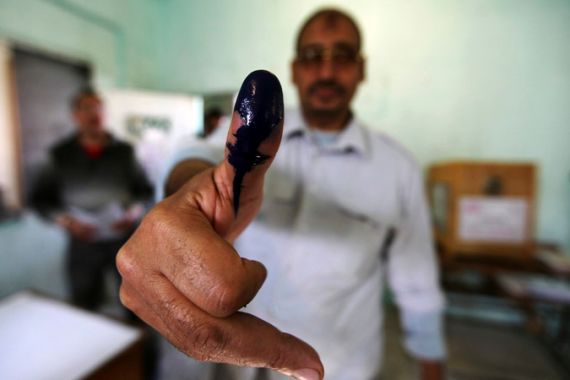Egypt election tallies favour Islamists
Party numbers suggest that the Muslim Brotherhood’s political wing won perhaps 40 per cent of votes.

 The first batch of results of Egypt’s landmark parliamentary elections is expected to be released on Thursday [AFP]
The first batch of results of Egypt’s landmark parliamentary elections is expected to be released on Thursday [AFP]Official results have not yet been released, but unofficial election tallies offered by Egypt’s political parties suggest a strong showing for Islamist parties, particularly the political wing of the Muslim Brotherhood.
The first round of elections for Egypt’s lower house of parliament began on Monday, when voters from nine of the country’s 27 governorates went to the polls.
The electoral commission has promised to release official results on Thursday, though only for the seats contested by individual candidates.
Results for the party list seats, which make up two-thirds of the People’s Assembly, will not be available until January.
Unofficial numbers have begun to leak out, though, mostly from sources within the parties.
A source in the Freedom and Justice Party (FJP), the Muslim Brotherhood’s political party, said on Wednesday that it had won roughly 40 per cent of the vote, according to its own exit polls.
The best results came in Fayoum governorate, south of Cairo; the source also said the FJP polled well in Cairo, Assiut and Red Sea governorates.
The party’s toughest competition was in Alexandria and Kafr al-Sheikh governorates, where al-Nour, a Salafi party, reportedly performed well.
The FJP is nominally a part of the Democratic Alliance, but the bloc’s other members are mostly small and unknown; FJP candidates comprise 70 per cent of the alliance’s candidates in party list districts, and 90 per cent in individual districts.
Strong showing predicted
Basil Adel, a member of the Egyptian Bloc, also predicted a strong showing for Islamists: He told Reuters that the Democratic Alliance had won between 40 and 50 per cent of the vote, and predicted a 5-to-7-per cent showing for the Nour party.
Adel said his own bloc, the main liberal alliance in Egypt, secured between 20 and 30 per cent of votes counted so far in Cairo.
Detailed results have leaked out from a handful of districts. The Muslim Brotherhood said its party had the highest tally in Fayoum, for example, with 199,677 votes; Nour was second, with 129,827. The third-highest vote tally went to the Freedom party, and it was a distant third, with just over 26,000 votes.
In Kafr al-Sheikh’s second district, the FJP was leading with 92,750 votes; the Nour party was second, with 67,634, and the secular Wafd came in third with 46,540, the Al-Masry Al-Youm newspaper reported.
Diaa Rashwan, the head of the Ahram Centre for Political and Strategic Studies, told Egypt’s state-run Al-Ahram newspaper that Islamist parties – including the FJP, Nour, and several other smaller parties – could collectively win 65 per cent of seats in the first round of voting.
Analysts had predicted a strong showing for the FJP, which is by far the best-organised political party in Egypt.
It fielded thousands of volunteers on election day to help voters at polling stations; many of them were accused of handing out flyers and doing other last-minute campaigning, which is illegal under Egyptian law.
Elections for the lower house of parliament will continue in two more stages over the next five weeks, with ballots on December 14 and January 3.